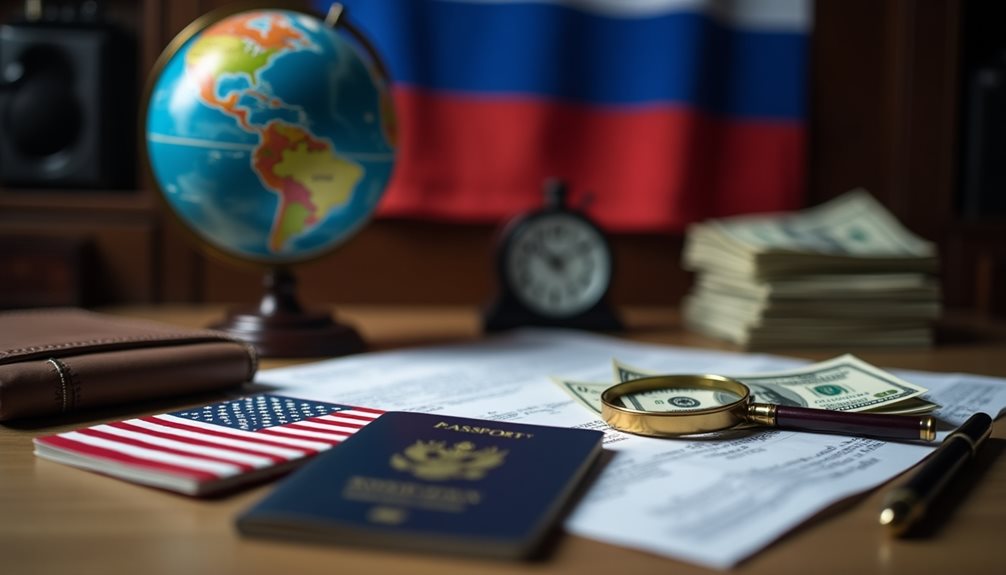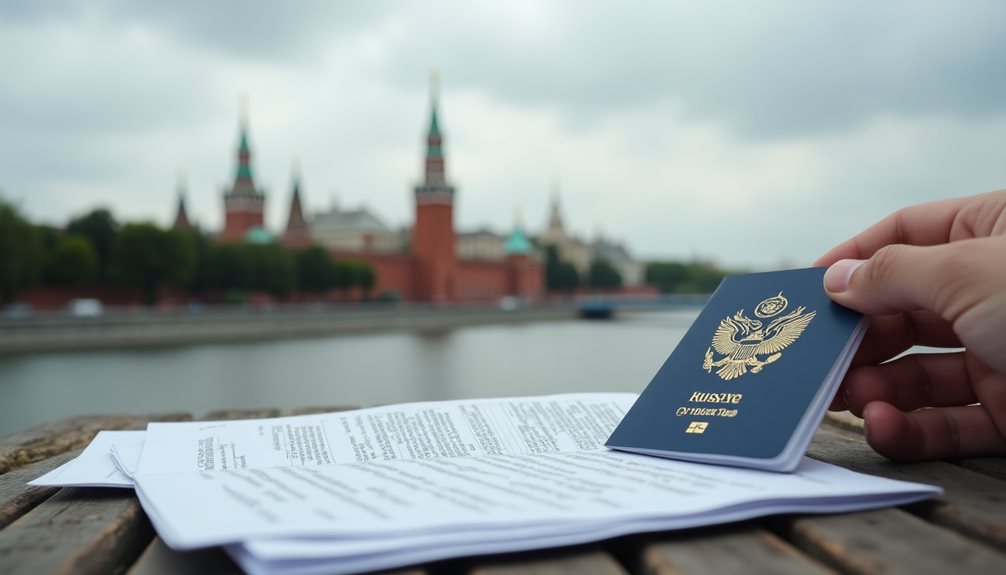Disclaimer
This article is intended for informational purposes only and should not be construed as legal advice. Visa requirements and immigration laws are subject to change, and individual circumstances may vary. Readers are strongly encouraged to consult with official government sources or legal professionals for the most accurate and up-to-date information regarding visa applications and immigration processes to Russia. The author and publisher disclaim any liability for actions taken based on the content of this article.
Planning Your Trip
When you’re considering a trip to Russia, understanding the visa requirements and immigration laws is essential. As an American, you’ll find the process isn’t always straightforward, with various visa types like tourist, business, and work, each demanding different documentation. The necessity of an invitation letter and the intricacies of the online application can be intimidating. But before you get overwhelmed, there’s more to uncover, including the impact of travel advisories and health mandates. Curious about how these regulations could affect your travel plans and what steps you need to take next?
Visa Types for Americans

Maneuvering the various visa types for Americans visiting Russia requires careful consideration of your travel purpose and duration. Each visa type serves a specific need, whether you’re visiting for leisure, business, work, or private matters.
The tourist visa, typically limited to 30 days, offers single or double entry options. Unfortunately, extensions aren’t usually granted, so planning your itinerary within this time frame is significant. It’s essential to note that an invitation requirement is necessary for all visa applications, which includes a filled form and passport copy.
On the other hand, business visas provide more flexibility with single, double, or multiple entry options, extending from one month up to three years. If your business dealings require longer stays, understanding the documentation, such as the original invitation letter from the Russian Federal Migration Service, is crucial. Visa extensions are generally not encouraged, so confirm your initial visa meets your needs.
Work visas, involving a more complex process with permits and quotas, can last up to three years. It’s important to complete registration within seven working days upon arrival to comply with local laws. For certain types of visas, an original HIV blood test certificate is required, which must be taken no earlier than 3 months before your application.
Private visas also offer multiple-entry options for three years, simplifying reentry. Always verify your documentation to guarantee smooth processing and maintain the freedom to explore Russia lawfully and effectively.
Invitation Necessities
Understanding the specific invitation requirements is essential to securing a Russian visa as an American traveler. Your journey starts with recognizing that an invitation is mandatory for any visa type. Various invitation types cater to different purposes: tourist, business, work, or private. Each serves a unique role in the invitation processes and must be tailored to your travel’s intent and duration.
Tourist invitations, for instance, come with accommodation confirmations, while business invitations need approval from the Russian Federal Migration Service. It is important to note that a tourist visa can be issued for short-term business, exhibitions, or medical consultations, which highlights the flexibility of this visa category.
The invitation process can be navigated through official channels. Tourist companies and hotels are common sources for tourist invitations, whereas business entities must obtain theirs via the Russian Federal Migration Service. Work invitations require inclusion of a work permit, and private invitations must be issued by a Russian citizen or legal entity. Securing an invitation is a critical step, as it is a fundamental requirement for obtaining a visa.
Electronic invitations, increasingly popular for their convenience, must be issued by the Russian Ministry of Foreign Affairs and include the inviting organization’s name.
Precision in the invitation process is vital. Each invitation must detail your visit’s purpose and duration. Securing the correct invitation not only guarantees compliance but also empowers your freedom to explore Russia legally and confidently.
Online Application Steps

Starting the online application process for a Russian visa requires meticulous attention to detail. Begin by visiting the official Russian government website to access the application form. Form completion is vital, so guarantee every field is filled out accurately and completely. Leaving any blanks could jeopardize your application.
Once you’ve filled out the form, you’ll need to upload electronic copies of all requested documents. Pay particular attention to photo requirements: a passport-type photograph with a white background, taken within the last six months, is essential.
You must provide detailed information, such as the full three-year period for a 3-year multiple-entry tourist visa. After completing the form, print it single-sided; double-sided prints will be rejected by the consulate. This attention to detail guarantees your application isn’t delayed.
Companies like Travisa and VisaHQ can guide you through this process, offering expertise in form completion and guaranteeing all documents meet the stringent requirements.
Required Documentation
Securing the necessary documentation for a Russian visa is a critical step in your application process.
Let’s start with the passport specifications: your passport must be valid for at least six months beyond your intended stay and contain at least two blank visa pages.
Verify your document preparation includes a recent passport photo, 2 inches by 2 inches, taken on a white background without eyeglasses or headwear, unless for religious purposes.
You’ll need an invitation letter, either an original business letter approved by the Russian Federal Migration Service or an electronic invitation from the Ministry of Foreign Affairs.
If traveling as a tourist, include a tourist voucher from a recognized company or hotel. For family visits, a notarized joint entry application will suffice. If hosted by a Russian citizen, include their registration stamp or residence permit.
Additional documents required are a birth certificate for minors and proof of legal status in the US, such as a Green Card.
For longer stays, prepare for an HIV/AIDS test. Remember, double-entry visas require an itinerary showing multiple entries.
Consular discretion allows for additional document requests, so be prepared.
Visa Fees and Timelines

When applying for a Russian visa, you’ll encounter various fees and timelines that are vital to your planning. Currently, for US citizens, the consular fee for single, double, or 3-year multiple-entry visas is $160, along with a $38 service charge at the Visa Application Centre. These fees are non-refundable, even if your application is denied. The standard processing time for a visa is 10 calendar days from the document submission date. Understanding the visa payment options is imperative; you can pay via cash, major credit or debit cards, or a money order to VFS Services (USA) Inc. Processing times for all visa types typically range from 4 to 20 business days, so it is essential to plan ahead to avoid any delays in your travel plans.
Regular processing takes about 10 calendar days, while expedited processing for single-entry visas, available only in emergencies, reduces the timeline to 3 business days without increasing the fee. This expedited processing is accessible in Visa Centers located in cities like Washington and New York.
Keep in mind that while emergency expedited service shortens timelines, it doesn’t apply to all situations.
Additional costs such as shipping fees for passport return, and potential third-party processing fees should be considered.
Preparation is key, so plan your timeline and budget accordingly to guarantee a smooth visa application process that aligns with your travel freedom aspirations.
Key Immigration Laws
Maneuvering through Russian immigration laws can be complex, especially for U.S. citizens, but understanding the key provisions is vital.
Russia offers simplified immigration processes for specific groups, including native Russian speakers, spouses of Russian citizens, highly qualified specialists, investors, and refugees. If you fall into one of these categories, you might bypass certain requirements such as language tests and quotas. Recently, a new immigration decree was signed by Vladimir Putin, which simplifies relocation for foreigners opposing Western neoliberal ideology. For instance, as a highly qualified specialist or investor, you can apply for permanent residency after just one year in Russia. Spouses of Russian citizens can seek permanent residency without first obtaining a temporary one. The majority of recent immigrants to Russia come from former Soviet republics, indicating strong regional migration trends.
For those not eligible for simplified processes, the standard path includes establishing a connection with Russia through employment, study, or investment. You’ll need a temporary residence permit before applying for permanent residency.
After five years, citizenship is possible, provided you pass language, history, and law exams.
Additionally, hiring an expert immigration attorney is strongly advised during the entire process.
Travel Tips

Russian visa and immigration laws are strictly enforced, and non-compliance can lead to severe consequences, including deportation or imprisonment. It’s important to keep your travel documentation precise and valid to avoid legal penalties.
Medical and Safety Considerations
When planning to travel to Russia, it’s beneficial to be aware of the medical and safety considerations that can enhance your experience. Access to healthcare may vary, especially in rural areas, so ensuring you have appropriate medical insurance is advisable for your visa application. Additionally, considering medical evacuation insurance can provide peace of mind while traveling.
For long-term stays, an HIV/AIDS test is required, reflecting the importance of health regulations in the country.
While exploring Russia, it’s wise to stay informed about local laws and customs. Understanding these can help ensure a smooth visit, as adherence to regulations is crucial. Engaging with local authorities or resources can provide valuable insights into maintaining safety during your travels.
In terms of safety, being mindful of your surroundings is essential. Some regions may have less signage or safety measures, so staying alert can help you navigate effectively. Emergency services may vary in responsiveness based on location, so having a plan for accessing assistance is beneficial.
Travel advisories can offer guidance on areas to approach with caution, helping you make informed decisions about your itinerary.
By preparing adequately and staying informed about health and safety updates from the Russian Embassy, you can enjoy a rewarding travel experience in Russia.





